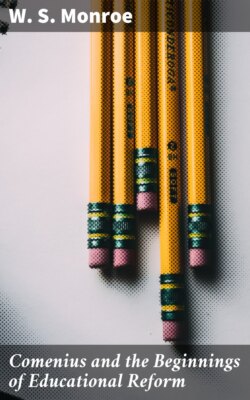Читать книгу Comenius and the Beginnings of Educational Reform - W. S. Monroe - Страница 9
На сайте Литреса книга снята с продажи.
Campanella, Andreæ, and Bateus
ОглавлениеTable of Contents
Comenius derived many of his philosophic concepts from the Dominican reformer, Thomas Campanella, whose writings influenced him powerfully, at least during his student years at Herborn and Heidelberg. The writings of Campanella convinced him of the unwisdom of the study of nature from the works of Aristotle. Books, Campanella had declared, are but dead copies of life, and are full of error and deception. We must ourselves explore nature and write down our own thoughts, the living mirror which shows the reflection of God’s countenance. These protests against scholasticism found a responsive chord in the thoughts of the young Comenius.
In the preface to the Prodromus Comenius is unreserved in his expression of obligations to his predecessors. “Who, indeed, should have the first place,” he says, “but John Valentine Andreæ, a man of nimble and clear brain.” The court preacher of Stuttgart had strongly impressed Comenius by his deep love for Christian ideals and his warm enthusiasm for their realization in practical life, as well as by his humorous polemics against the dead scholasticism of his day. Comenius incorporates in his Great didactic a brief by Andreæ on “the use of the art of teaching,” in which he maintains (1) that parents up to this time have been uncertain how much to expect from their children; (2) that schoolmasters, the greater number of whom have been ignorant of their art, have exhausted their energies and worn themselves out in their efforts to fulfil their duty; (3) that students should master the sciences without difficulty, tedium, or blows, as if in sport and in merriment; (4) that schools should become places of amusement, houses of delight and attraction, and the work so adjusted that students of whatever capacity might attain a high standard of development; (5) that states should exist for the development of the young; (6) that schools should be so efficient that the Church may never lack learned doctors, and the learned doctors lack suitable hearers; and (7) that the schools may be so reformed that they may give a more exact and universal culture of the intellect, and that Christian youths may be more fervently stirred up to vigor of mind and love of heavenly things. “Let none, therefore,” says Andreæ, “withdraw his thoughts, desires, strength, and resources from such a sacred undertaking. It is inglorious to despair of progress and wrong to despise the counsel of others.”
The obligation of Comenius to William Bateus, the Irish Jesuit, was not great, although he makes free acknowledgment of the same in the Janua. Indeed, the plan of the Janua was well formulated before he knew of the existence of the Jesuit father’s book. He made known the plan of his Janua to some friends, who told him that Bateus had already published a similar work. He was not content until he had procured a copy of the book. “The idea,” says Comenius, “was better than the execution. Nevertheless, as he was the prime inventor, I thankfully acknowledge it, nor will I upbraid him for those errors he has committed.” This willing recognition of his obligation to a wide range of educational writers is proof of the declaration he often made, “I care not whether I act the part of teacher or learner.”
